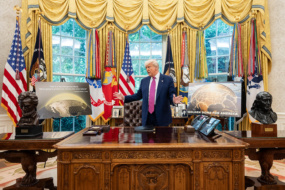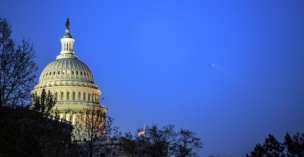The commercial remote sensing industry is showing no signs of slowing down, and the new head of the Commercial Remote Sensing Regulatory Affairs division wants to make sure the government can keep up.
CRSRA 101: The Commercial Remote Sensing Regulatory Affairs (CRSRA) division is in charge of issuing licenses to commercial operators looking to collect images from space, monitoring compliance with license terms and laws, and working with national security agencies to address any potential security concerns—a mission it undertakes with just four staff.
The office has undergone a pair of significant changes in the past few months. After moving from NOAA’s National Environmental Satellite, Data, and Information Service to the Office of Space Commerce in November, it now has a new director: Sarah Brothers, who previously worked at the Aerospace Corporation, Johns Hopkins’ APL, and the National Academies of Sciences, Engineering, and Medicine.
Licensing at scale: The office oversees 78 licensees who have received 99 licenses for 1,386 satellites. Brothers said her top goal is to make the division’s processes scalable to keep up as the industry grows and those numbers inevitably increase.
“The licensed population has continued to grow steadily,” she told Payload. “Our processes are still manually intensive though, so one of my focuses is how do we come to a place and employ technology particularly to help CRSRA implement processes that will allow it to scale.”
That includes adding more automated and semi-automated workflows, she said. Companies that need to contact the office today need to send an email and wait for a staff member to email back. Brothers wants to see more modern day customer service technology, including automatic notifications for companies about next steps to take in the licensing process or submitting a help ticket instead of relying on back-and-forth communication like email.
Great expectations: It now takes the office, on average, 14 days to issue a new license, down from ~48 days in 2020, according to a spokesperson. Last year, the office also cut 69 conditions across 11 licenses to streamline regulations.
But don’t expect the substantial changes made in 2023 to continue at the same rate, Brothers said.
“I’m afraid we’ve been victims of our own success. I think we may have once again set unrealistic expectations for a future in which there’s the potential that resources have not grown in parallel with the industry growth,” she said.
What’s next: The biggest question hanging over the office is whether or not it will take on increased responsibilities and authorities under the administration’s legislative proposal, which would give the Office of Space Commerce oversight over other uncrewed missions, such as ISAM and debris removal. Late last year, the National Space Council sent its plan to Capitol Hill, where it is still being considered by lawmakers.
Geek out: Brothers’ love of space extends to her free time too. “I’m a Star Trek fan,” she said. “Original series, Next Generation and Deep Space Nine are my favorite series.”




